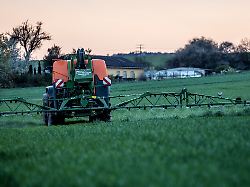“No critical areas”
Glyphosate re-approval is approaching
07/06/2023, 2:25 p.m
The cancer research agency IARC classifies glyphosate as “probably carcinogenic”. However, the EU food safety authority has no objections to re-approval. The process thus enters the final phase.
The European Food Safety Authority (EFSA) sees renewed approval of the weed killer glyphosate in the European Union as uncritical. In a re-evaluation of glyphosate by the agency, EFSA did not identify any critical areas of concern in the risk assessment of the active substance in relation to the risk it poses to humans, animals and the environment.
This assessment is the result of more than three years of work by dozens of scientists from EFSA and the Member States. ‘It is based on the analysis of many thousands of studies and scientific articles,’ explained EFSA’s head of risk assessment, Guilhem de Seze. EFSA pointed out that the European Chemicals Agency (ECHA) concluded in a 2022 hazard assessment of glyphosate that the active substance does not meet the scientific criteria for classification as a carcinogenic, mutagenic or toxic substance for reproduction.
“EFSA used ECHA’s hazard classification for the purpose of the EU risk assessment of glyphosate.” With the EFSA assessment, the process of re-approving glyphosate in the EU is entering its final phase. Based on the scientific conclusions of the authority, the European Commission will prepare a draft regulation on the extension or non-renewal of the approval of the active substance. The member states are expected to vote on this in the third quarter. Glyphosate approval in the EU runs until December 15 of this year.
Glyphosate is one of the most widely used herbicides in the world and was developed by the US company Monsanto, which the German pharmaceutical and agrochemical group Bayer took over. With the acquisition, Bayer also brought a wave of lawsuits into the house because of the alleged carcinogenic effects of glyphosate, which weighed heavily on the company.
Authorities worldwide, including the US Environmental Protection Agency and the European Chemicals Agency, have classified the herbicide as non-carcinogenic. Only the cancer research agency IARC rated the active ingredient as “probably carcinogenic” in 2015. The plaintiffs relied on this assessment. Other companies also produce the so-called broad spectrum herbicide, which works against all green plants.
